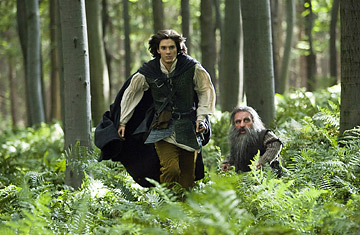
Ben Barnes, left, and Warwick Davis in The Chronicles of Narnia: Prince Caspian.
Can God make one movie franchise a hit and another a flop? That was the question hovering over the first film adaptations of two best-selling fantasy series for children, C.S. Lewis' The Chronicles of Narnia and Philip Pullman's His Dark Materials. Lewis' series of seven books, published in the 1950s, was widely seen as a Christian allegory, presided over by the God-lion Aslan, who dies and rises again. Pullman's trilogy, written in the 1990s, described a battle between a dictatorial deity and the rebel angels determined to defeat him. As the author told the Sydney Morning Herald in 2003, "My books are about killing God."
Not quite yet, the Almighty seemed to say when the initial movies based on these franchises were released. The Chronicles of Narnia: The Lion, the Witch and the Wardrobe premiered in late 2005 and earned a burly $291.7 million at the domestic box office, plus $453.1 million abroad, briefly becoming Walt Disney Co.'s all-time top-grossing live-action film. The first sequel, The Chronicles of Narnia: Prince Caspian, has just arrived, with blockbuster expectations. And the next chapter, The Voyage of the Dawn Treader, has already reserved the first May weekend of 2010 to open in movie theaters around the world.
The Golden Compass, the first of the Pullman trilogy, reached the screen last December. It cost the same as The Lion, the Witch and the Wardrobe ($180 million) but grossed only $70 million at the domestic box office. The very respectable $301 million the movie earned in foreign markets wasn't enough to mask the disappointment of its producing studio, New Line. No sequels were green-lighted, and in February New Line was folded into its parent company, Warner Bros.
They of Little Faith
The two movies were alike in at least one major way: they did their darnedest to mute elements of religion. Anyone unaware of the books' underlying religious themes would not have become aware of them from the film versions. Both were streamlined into familiar epics of children finding adventure and peril in a fantasy realm of talking animals and fearsome monarchs; the young people in these tales might have been Dorothy yanked from Kansas and set down in Oz. Whatever was lost in the transfer of these stories from page to screen, they retained the crucial lure of all kid lit: the scary, liberating trip out of the everyday into the magical otherworld, where children can imagine themselves as heroes, just before bedtime.
The changes were inevitable and probably for the best. Not many kids beg to be told a ripping yarn with a feline Messiah. The theological touches in the Lewis and Pullman books are things for adults to ponder--and, when the movie versions come out, to praise or protest. Remember when that pagan fable about Harry Potter appeared as a film? An anguished cry rose from certain Christian groups, but that didn't stop the movies from grossing billions, nor did the films noticeably corrupt the little ones.
One other similarity in the two films: to this adult's eyes, they were of only middling quality. The Golden Compass was middling-good, with a beguiling central performance by 13-year-old Dakota Blue Richards, a slinky turn by Nicole Kidman as an evil-stepmom type and a nifty polar-bear fight. But the film never cohered, and at the end it trailed off into a preview of the two sequels that now don't look as if they'll be made. The first Narnia movie was middling-bad, its four lead child actors displaying little charm, their world holding lesser wonder. But, hey, it was a hit because the Lewis books had been popular with the parents and grandparents who took their young charges to see it and because the range of ages of the four young heroes gave kids from 6 to 16 someone to identify with. Disney marketed the film smartly, playing up the Christian aspects to religious groups and playing them down to everyone else. Now Prince Caspian (directed, like the first film, by Andrew Adamson) should be a box-office dynamo.
Out of Sight
That's because it elbows the kid stars into the background to concentrate on the character who, if the movies follow the books, will dominate the next two films in the series. That's Caspian (Ben Barnes), the rightful heir to the throne of the Telmarines, who currently rule Narnia. He escapes the castle just before evil Lord Miraz (Sergio Castellitto) can kill him and is exiled among rancorous dwarfs, a talking badger, centaurs and minotaurs, the recently returned four Pevensie children and, after a high body count, Aslan (voiced by Liam Neeson).
Barnes, a 26-year-old recruit from the London stage, looks like a softer Keanu Reeves and speaks in a Mediterranean accent a bit too reminiscent of Mandy Patinkin's in The Princess Bride. In this film, Caspian is a callow gallant, too sensitive in his fights with Miraz to close the duel. (He'll grow up fast in the next one.) But the CGI supporting characters are the big attraction here: Reepicheep, a mouse with some of the charming swagger of Antonio Banderas' Puss in Boots from the Shrek movies; stately tree warriors who come to Caspian's aid; magical leaves that swirl into a woman's shape; and a bearded water god who rises like some stern patriarch to drown a slew of infidels. Lots of cool stuff.
There's also a smidgen of theology, in the youngest girl's faith that Aslan will materialize. He does, of course, to warn her, "Things never happen the same way twice." That goes for stories of belief when they're turned into big commercial movies. Prince Caspian does its job as epic-size entertainment. If parents want a real adventure with a more overt Christian message, they can curl up with the New Testament.
Two books that changed the way we see America Photography, page 68
